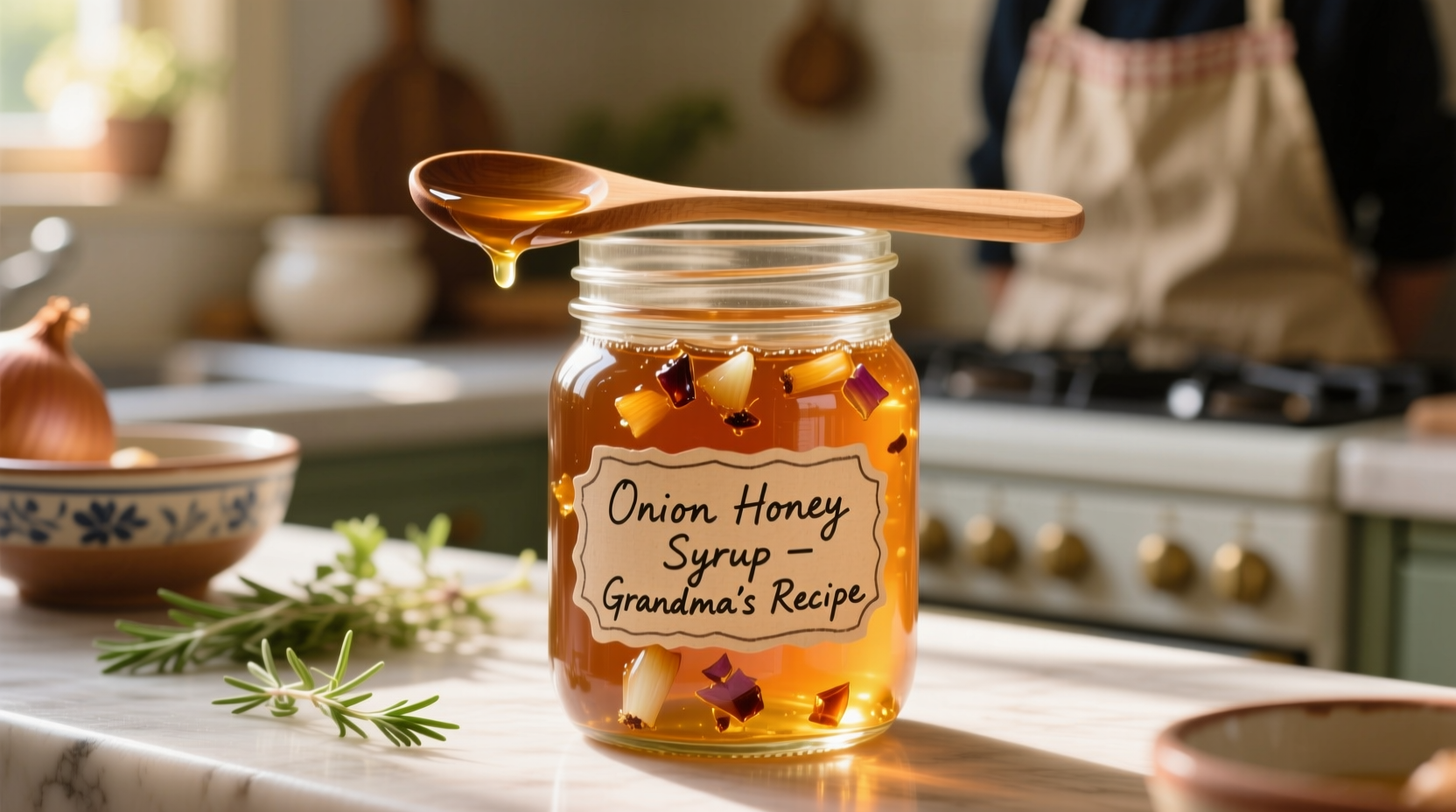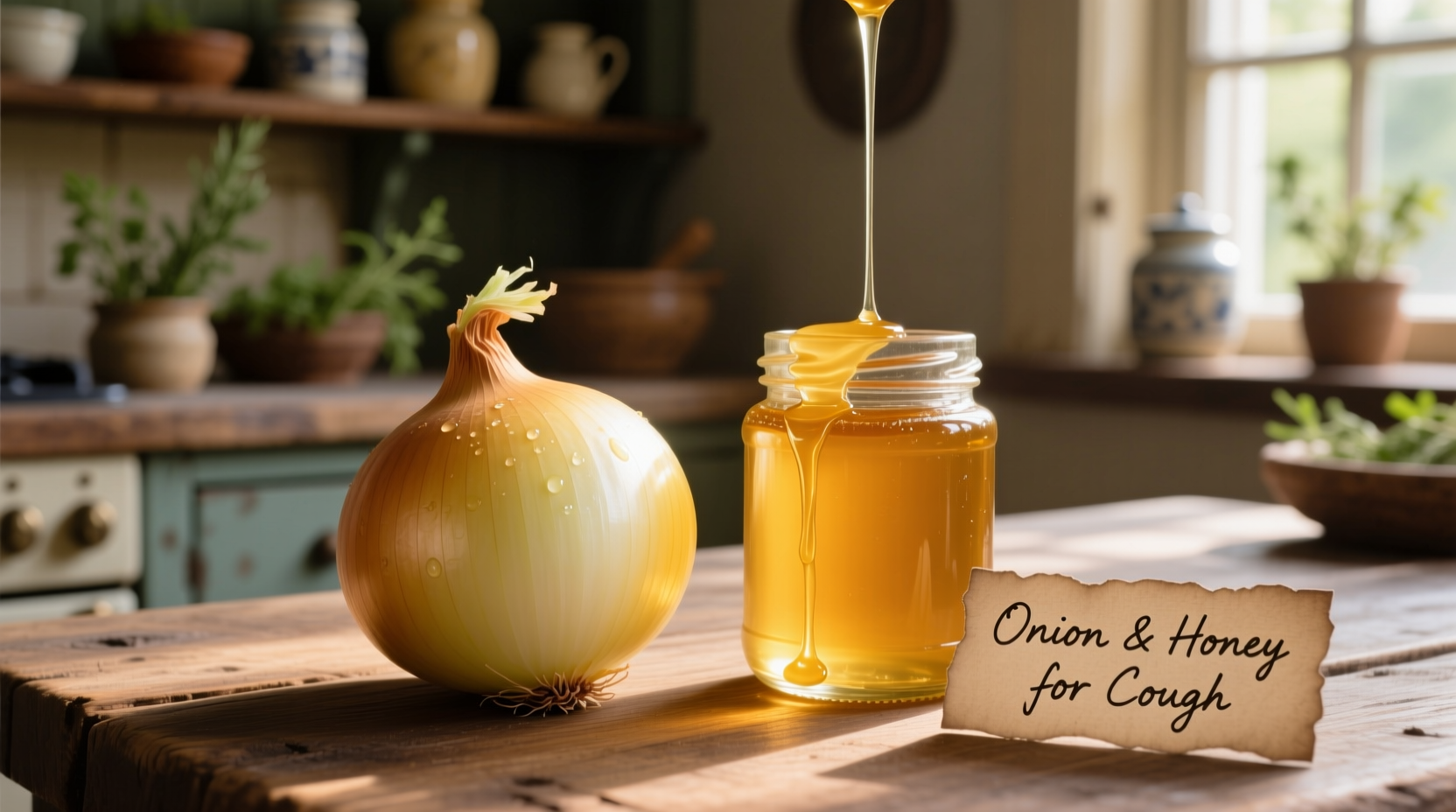The Science Behind Onion and Honey for Cough Relief
When you're searching for natural cough remedies that actually work, onion and honey stands out as one of the most time-tested combinations. But does it have scientific backing? Let's examine what research tells us about this traditional remedy.
Honey has been extensively studied for its cough-relieving properties. According to a CDC recommendation, honey can be an effective option for cough relief in children over one year old and adults. Multiple studies, including research published in the Journal of Alternative and Complementary Medicine, have found that honey works as well as or better than many over-the-counter cough medicines for reducing nighttime coughing and improving sleep.
Onions contain quercetin, a flavonoid with potential anti-inflammatory and antioxidant properties. While direct research on onion syrup specifically for coughs is limited, traditional medicine systems worldwide have used onions for respiratory ailments for centuries. The sulfur compounds in onions may help break up mucus, while their antimicrobial properties could support the body's natural defenses.

How to Prepare Onion and Honey Remedy Properly
For those seeking how to make onion honey syrup for cough at home, proper preparation matters. Here's a scientifically informed method that maximizes potential benefits:
- Peel and finely chop one medium yellow onion (about 1 cup)
- Place chopped onion in a clean glass jar
- Add 2-3 tablespoons of raw, unprocessed honey (manuka honey has additional benefits)
- Cover the jar and let it sit at room temperature for 4-6 hours
- The onion will release its juices, mixing with the honey to create a syrup
- Strain the mixture, reserving the syrup
For natural cough remedy for adults, take 1-2 teaspoons of the syrup as needed, up to 3-4 times daily. Children over 1 year can take 1/2 to 1 teaspoon. Never give honey to infants under 12 months due to botulism risk.
| Remedy Type | Effectiveness for Cough | Time to Relief | Safety Considerations |
|---|---|---|---|
| Onion and Honey Syrup | Moderate for mild coughs | 30-60 minutes | Not for infants under 1 year |
| OTC Cough Medicines | Varies by ingredient | 15-30 minutes | Potential side effects, not for young children |
| Plain Honey | Moderate to high | 20-45 minutes | Not for infants under 1 year |
When This Remedy Works Best (and When It Doesn't)
Understanding the limitations of home remedies for cough is crucial for safe usage. Onion and honey works best for:
- Dry, irritating coughs from mild colds
- Nighttime coughing that disrupts sleep
- Early stages of respiratory infections
- As a complement to other supportive care
It's less effective or inappropriate for:
- Coughs lasting more than 2 weeks
- Coughs with high fever or difficulty breathing
- Coughs producing colored mucus (could indicate bacterial infection)
- Infants under 1 year (due to honey)
According to the UK's National Health Service, you should consult a healthcare provider if your cough persists beyond 3 weeks, is accompanied by chest pain, or if you're coughing up blood.
Comparing to Other Natural Cough Remedies
When evaluating best natural cough suppressants for adults, it helps to understand how onion and honey stacks up against other options:
Honey alone has stronger evidence behind it than many other home remedies. The World Health Organization includes honey in its Model List of Essential Medicines for children's coughs. Ginger tea with lemon offers similar soothing properties but lacks honey's proven cough-suppressing effects. Saltwater gargles work well for sore throats but don't directly address coughing.
Unlike many over-the-counter cough medicines that contain dextromethorphan or codeine (which have limited effectiveness and potential side effects), onion and honey provides a gentler approach with fewer risks for most people.
Historical Context of This Traditional Remedy
The use of onion and honey for respiratory issues spans multiple cultures and centuries. Historical records show ancient Egyptians used honey for its medicinal properties, while onions were documented in Greek and Roman medical texts for treating respiratory ailments.
During the 1918 influenza pandemic, many households relied on onion and honey syrup when conventional medicines were scarce. Traditional European folk medicine often included "onion poultices" placed on the chest, while honey has been used globally as a natural cough suppressant.
Practical Tips for Maximum Benefit
To get the most from your onion honey cough remedy at home:
- Use raw, unprocessed honey which retains more beneficial compounds
- Yellow onions contain more quercetin than white onions
- Let the mixture sit longer (up to 12 hours) for stronger extraction
- Store in the refrigerator for up to 2 weeks
- Take the syrup slowly, allowing it to coat your throat
Combine this remedy with other supportive measures like staying hydrated, using a humidifier, and getting adequate rest for the best results with natural cough relief without medication.
When to Seek Medical Attention
While home remedies can provide comfort, they're not substitutes for medical care when needed. Consult a healthcare provider if:
- Cough persists beyond 2-3 weeks
- You experience high fever (over 101°F/38.3°C)
- You have difficulty breathing or chest pain
- You're coughing up blood or rust-colored mucus
- You develop wheezing or whistling sounds when breathing
The American College of Chest Physicians emphasizes that persistent coughs warrant medical evaluation to rule out serious conditions like pneumonia, bronchitis, or other respiratory issues.











 浙公网安备
33010002000092号
浙公网安备
33010002000092号 浙B2-20120091-4
浙B2-20120091-4